401206 Reflection: Aboriginal and Torres Strait Islander Health
VerifiedAdded on 2022/09/25
|5
|999
|22
Assignment
AI Summary
This assignment is a critical reflection on Aboriginal and Torres Strait Islander health, structured using the Gibbs reflective cycle. The student identifies the health gap between Indigenous and non-Indigenous Australians as a key issue, influenced by factors like racism, poor access to healthcare, and social determinants. Initially holding preconceived notions, the student reflects on their feelings before and after learning about the issue, acknowledging personal biases and the impact of cultural, social, and political aspects on health outcomes. The analysis highlights the importance of education, equal treatment, and addressing health disparities, concluding with a commitment to improving their understanding and challenging their own attitudes. The student plans to further explore the social determinants of health and seeks to contribute to positive change by increasing knowledge and providing adequate care. The reflection incorporates peer-reviewed references to support its arguments.
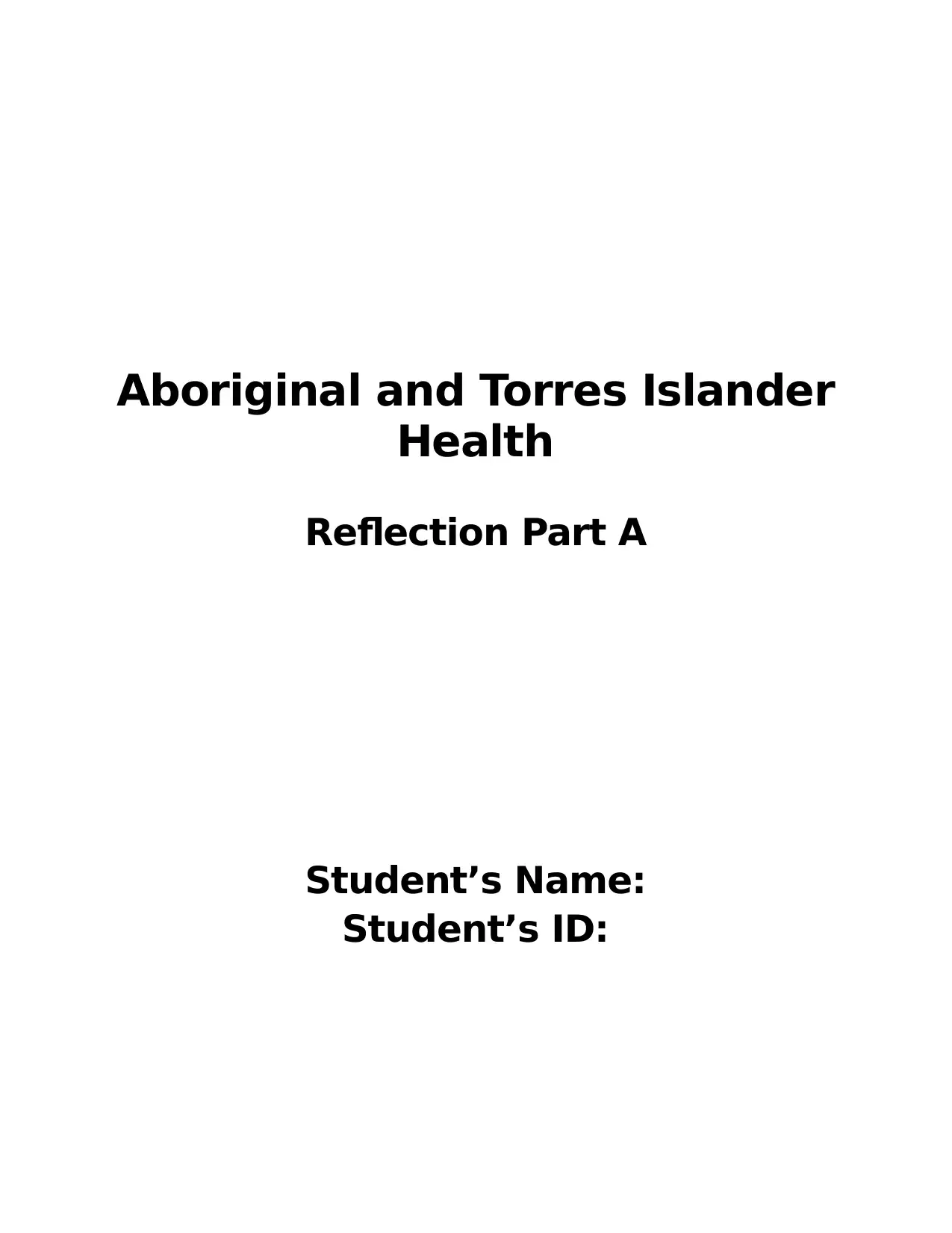
Aboriginal and Torres Islander
Health
Reflection Part A
Student’s Name:
Student’s ID:
Health
Reflection Part A
Student’s Name:
Student’s ID:
Paraphrase This Document
Need a fresh take? Get an instant paraphrase of this document with our AI Paraphraser
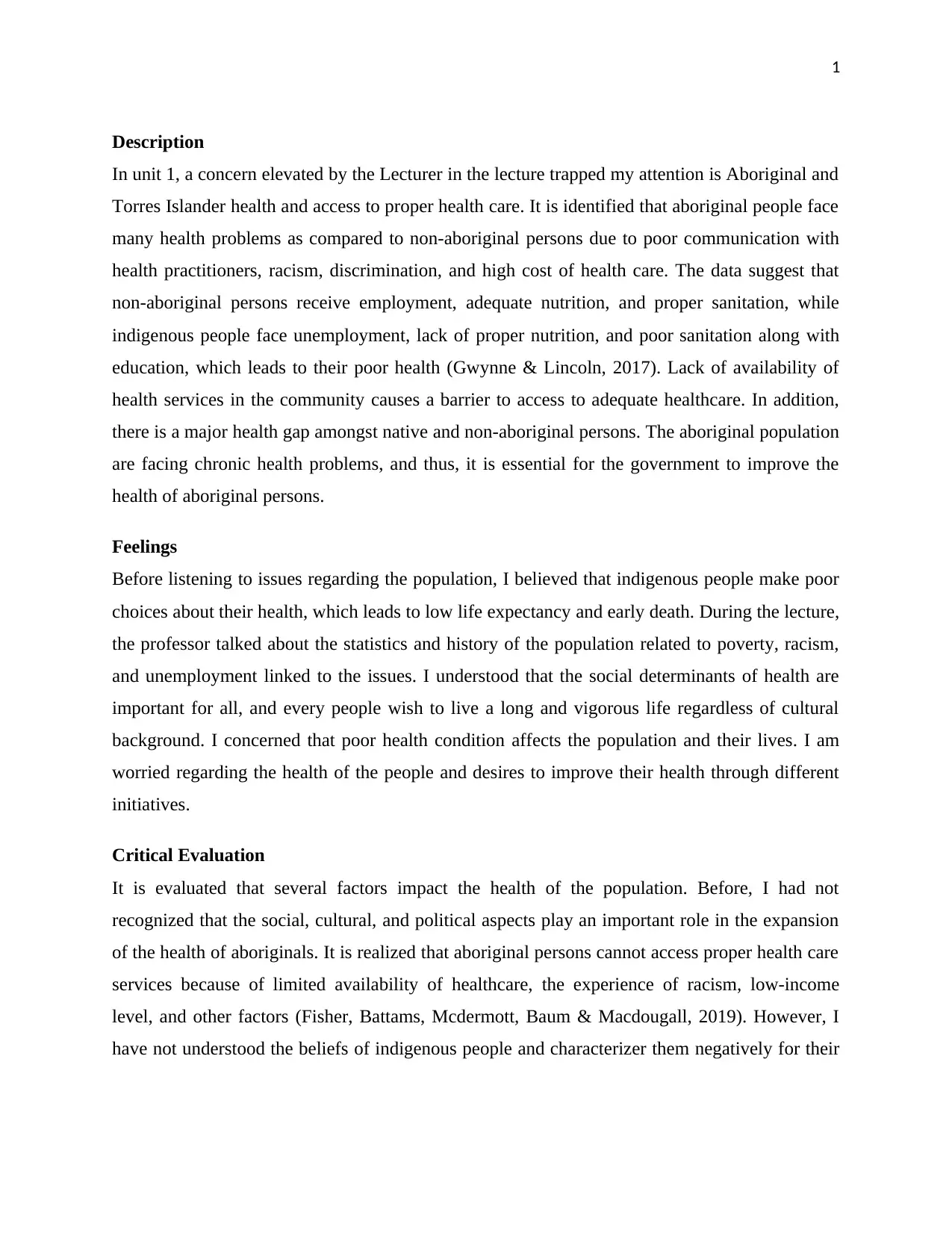
1
Description
In unit 1, a concern elevated by the Lecturer in the lecture trapped my attention is Aboriginal and
Torres Islander health and access to proper health care. It is identified that aboriginal people face
many health problems as compared to non-aboriginal persons due to poor communication with
health practitioners, racism, discrimination, and high cost of health care. The data suggest that
non-aboriginal persons receive employment, adequate nutrition, and proper sanitation, while
indigenous people face unemployment, lack of proper nutrition, and poor sanitation along with
education, which leads to their poor health (Gwynne & Lincoln, 2017). Lack of availability of
health services in the community causes a barrier to access to adequate healthcare. In addition,
there is a major health gap amongst native and non-aboriginal persons. The aboriginal population
are facing chronic health problems, and thus, it is essential for the government to improve the
health of aboriginal persons.
Feelings
Before listening to issues regarding the population, I believed that indigenous people make poor
choices about their health, which leads to low life expectancy and early death. During the lecture,
the professor talked about the statistics and history of the population related to poverty, racism,
and unemployment linked to the issues. I understood that the social determinants of health are
important for all, and every people wish to live a long and vigorous life regardless of cultural
background. I concerned that poor health condition affects the population and their lives. I am
worried regarding the health of the people and desires to improve their health through different
initiatives.
Critical Evaluation
It is evaluated that several factors impact the health of the population. Before, I had not
recognized that the social, cultural, and political aspects play an important role in the expansion
of the health of aboriginals. It is realized that aboriginal persons cannot access proper health care
services because of limited availability of healthcare, the experience of racism, low-income
level, and other factors (Fisher, Battams, Mcdermott, Baum & Macdougall, 2019). However, I
have not understood the beliefs of indigenous people and characterizer them negatively for their
Description
In unit 1, a concern elevated by the Lecturer in the lecture trapped my attention is Aboriginal and
Torres Islander health and access to proper health care. It is identified that aboriginal people face
many health problems as compared to non-aboriginal persons due to poor communication with
health practitioners, racism, discrimination, and high cost of health care. The data suggest that
non-aboriginal persons receive employment, adequate nutrition, and proper sanitation, while
indigenous people face unemployment, lack of proper nutrition, and poor sanitation along with
education, which leads to their poor health (Gwynne & Lincoln, 2017). Lack of availability of
health services in the community causes a barrier to access to adequate healthcare. In addition,
there is a major health gap amongst native and non-aboriginal persons. The aboriginal population
are facing chronic health problems, and thus, it is essential for the government to improve the
health of aboriginal persons.
Feelings
Before listening to issues regarding the population, I believed that indigenous people make poor
choices about their health, which leads to low life expectancy and early death. During the lecture,
the professor talked about the statistics and history of the population related to poverty, racism,
and unemployment linked to the issues. I understood that the social determinants of health are
important for all, and every people wish to live a long and vigorous life regardless of cultural
background. I concerned that poor health condition affects the population and their lives. I am
worried regarding the health of the people and desires to improve their health through different
initiatives.
Critical Evaluation
It is evaluated that several factors impact the health of the population. Before, I had not
recognized that the social, cultural, and political aspects play an important role in the expansion
of the health of aboriginals. It is realized that aboriginal persons cannot access proper health care
services because of limited availability of healthcare, the experience of racism, low-income
level, and other factors (Fisher, Battams, Mcdermott, Baum & Macdougall, 2019). However, I
have not understood the beliefs of indigenous people and characterizer them negatively for their
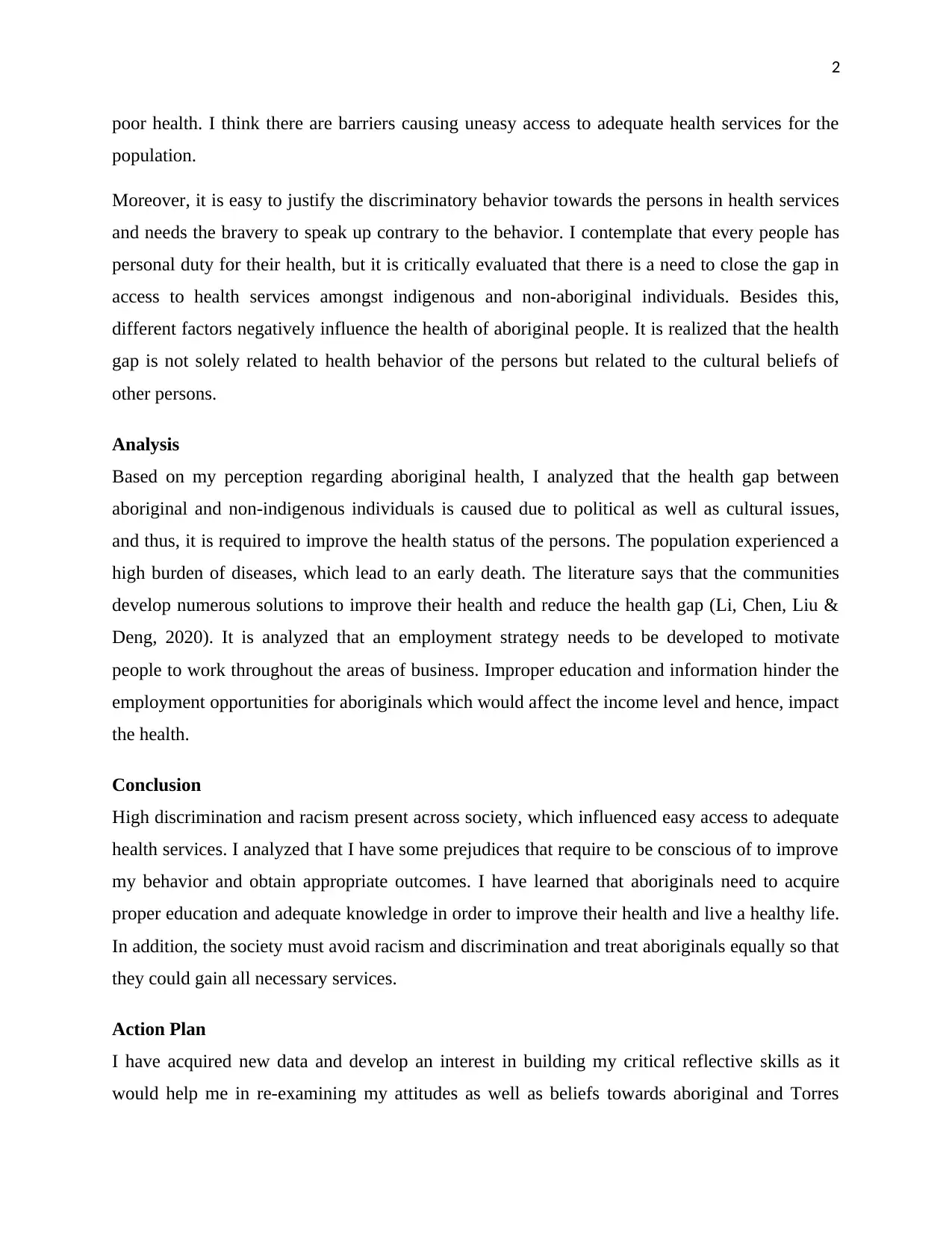
2
poor health. I think there are barriers causing uneasy access to adequate health services for the
population.
Moreover, it is easy to justify the discriminatory behavior towards the persons in health services
and needs the bravery to speak up contrary to the behavior. I contemplate that every people has
personal duty for their health, but it is critically evaluated that there is a need to close the gap in
access to health services amongst indigenous and non-aboriginal individuals. Besides this,
different factors negatively influence the health of aboriginal people. It is realized that the health
gap is not solely related to health behavior of the persons but related to the cultural beliefs of
other persons.
Analysis
Based on my perception regarding aboriginal health, I analyzed that the health gap between
aboriginal and non-indigenous individuals is caused due to political as well as cultural issues,
and thus, it is required to improve the health status of the persons. The population experienced a
high burden of diseases, which lead to an early death. The literature says that the communities
develop numerous solutions to improve their health and reduce the health gap (Li, Chen, Liu &
Deng, 2020). It is analyzed that an employment strategy needs to be developed to motivate
people to work throughout the areas of business. Improper education and information hinder the
employment opportunities for aboriginals which would affect the income level and hence, impact
the health.
Conclusion
High discrimination and racism present across society, which influenced easy access to adequate
health services. I analyzed that I have some prejudices that require to be conscious of to improve
my behavior and obtain appropriate outcomes. I have learned that aboriginals need to acquire
proper education and adequate knowledge in order to improve their health and live a healthy life.
In addition, the society must avoid racism and discrimination and treat aboriginals equally so that
they could gain all necessary services.
Action Plan
I have acquired new data and develop an interest in building my critical reflective skills as it
would help me in re-examining my attitudes as well as beliefs towards aboriginal and Torres
poor health. I think there are barriers causing uneasy access to adequate health services for the
population.
Moreover, it is easy to justify the discriminatory behavior towards the persons in health services
and needs the bravery to speak up contrary to the behavior. I contemplate that every people has
personal duty for their health, but it is critically evaluated that there is a need to close the gap in
access to health services amongst indigenous and non-aboriginal individuals. Besides this,
different factors negatively influence the health of aboriginal people. It is realized that the health
gap is not solely related to health behavior of the persons but related to the cultural beliefs of
other persons.
Analysis
Based on my perception regarding aboriginal health, I analyzed that the health gap between
aboriginal and non-indigenous individuals is caused due to political as well as cultural issues,
and thus, it is required to improve the health status of the persons. The population experienced a
high burden of diseases, which lead to an early death. The literature says that the communities
develop numerous solutions to improve their health and reduce the health gap (Li, Chen, Liu &
Deng, 2020). It is analyzed that an employment strategy needs to be developed to motivate
people to work throughout the areas of business. Improper education and information hinder the
employment opportunities for aboriginals which would affect the income level and hence, impact
the health.
Conclusion
High discrimination and racism present across society, which influenced easy access to adequate
health services. I analyzed that I have some prejudices that require to be conscious of to improve
my behavior and obtain appropriate outcomes. I have learned that aboriginals need to acquire
proper education and adequate knowledge in order to improve their health and live a healthy life.
In addition, the society must avoid racism and discrimination and treat aboriginals equally so that
they could gain all necessary services.
Action Plan
I have acquired new data and develop an interest in building my critical reflective skills as it
would help me in re-examining my attitudes as well as beliefs towards aboriginal and Torres
⊘ This is a preview!⊘
Do you want full access?
Subscribe today to unlock all pages.

Trusted by 1+ million students worldwide
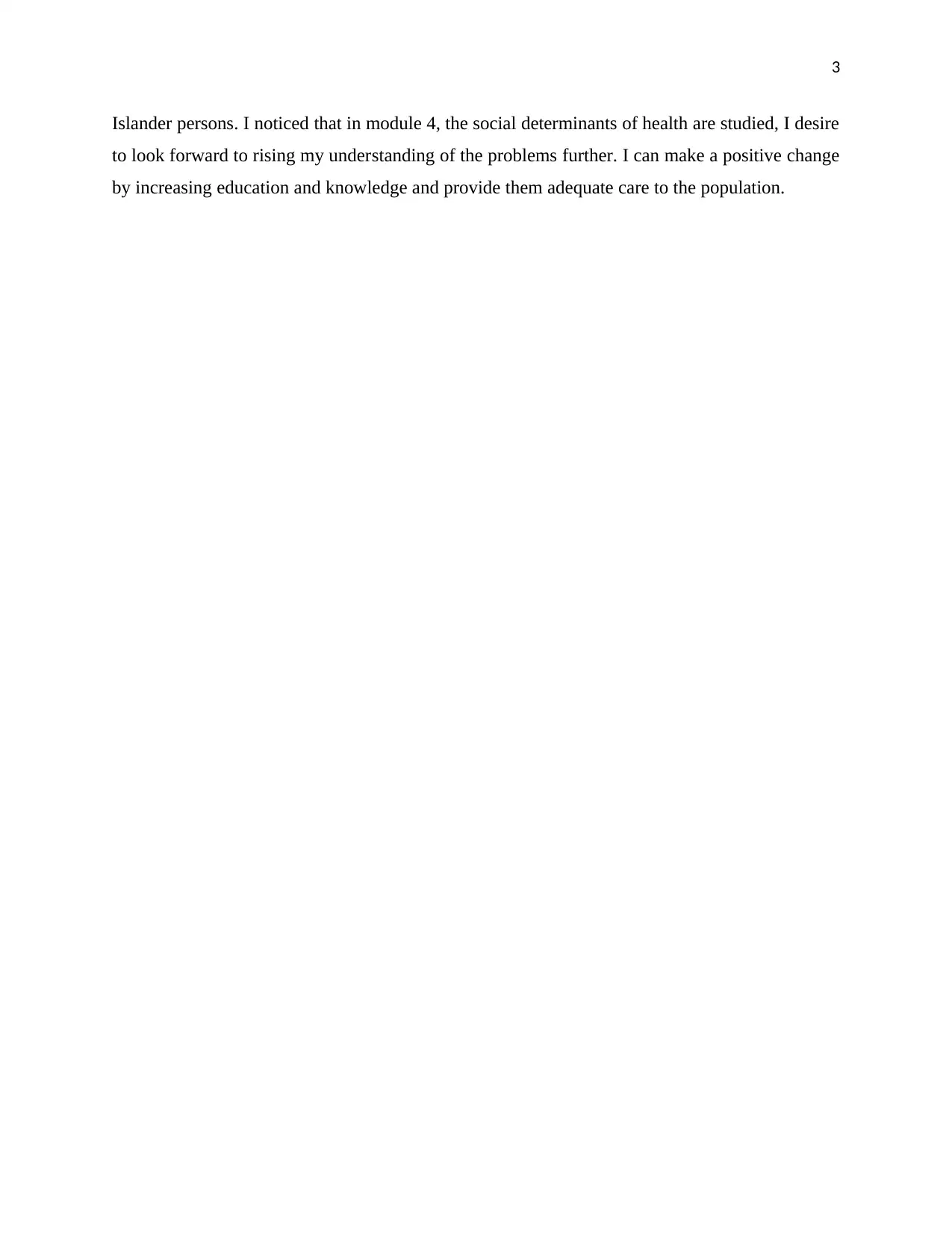
3
Islander persons. I noticed that in module 4, the social determinants of health are studied, I desire
to look forward to rising my understanding of the problems further. I can make a positive change
by increasing education and knowledge and provide them adequate care to the population.
Islander persons. I noticed that in module 4, the social determinants of health are studied, I desire
to look forward to rising my understanding of the problems further. I can make a positive change
by increasing education and knowledge and provide them adequate care to the population.
Paraphrase This Document
Need a fresh take? Get an instant paraphrase of this document with our AI Paraphraser
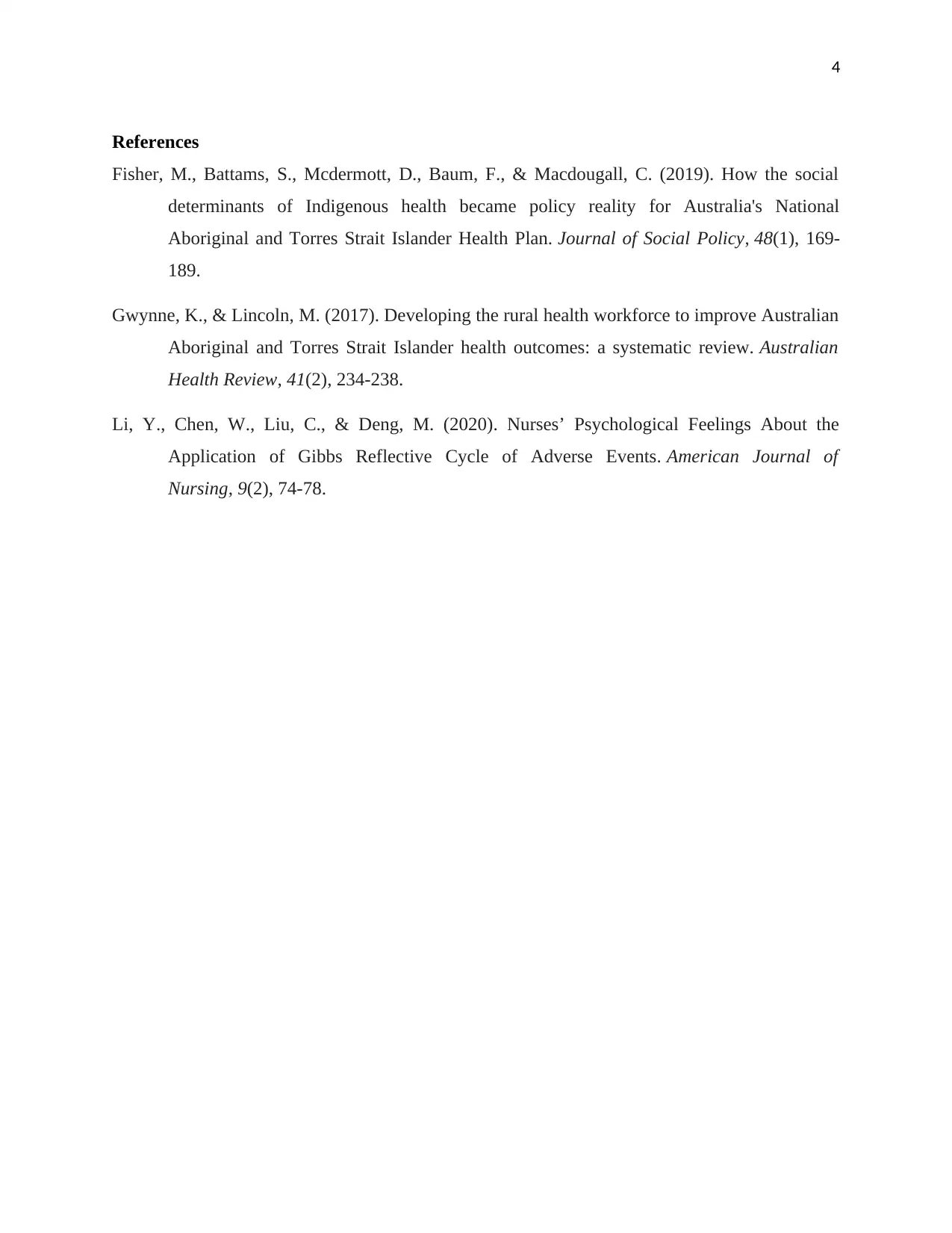
4
References
Fisher, M., Battams, S., Mcdermott, D., Baum, F., & Macdougall, C. (2019). How the social
determinants of Indigenous health became policy reality for Australia's National
Aboriginal and Torres Strait Islander Health Plan. Journal of Social Policy, 48(1), 169-
189.
Gwynne, K., & Lincoln, M. (2017). Developing the rural health workforce to improve Australian
Aboriginal and Torres Strait Islander health outcomes: a systematic review. Australian
Health Review, 41(2), 234-238.
Li, Y., Chen, W., Liu, C., & Deng, M. (2020). Nurses’ Psychological Feelings About the
Application of Gibbs Reflective Cycle of Adverse Events. American Journal of
Nursing, 9(2), 74-78.
References
Fisher, M., Battams, S., Mcdermott, D., Baum, F., & Macdougall, C. (2019). How the social
determinants of Indigenous health became policy reality for Australia's National
Aboriginal and Torres Strait Islander Health Plan. Journal of Social Policy, 48(1), 169-
189.
Gwynne, K., & Lincoln, M. (2017). Developing the rural health workforce to improve Australian
Aboriginal and Torres Strait Islander health outcomes: a systematic review. Australian
Health Review, 41(2), 234-238.
Li, Y., Chen, W., Liu, C., & Deng, M. (2020). Nurses’ Psychological Feelings About the
Application of Gibbs Reflective Cycle of Adverse Events. American Journal of
Nursing, 9(2), 74-78.
1 out of 5
Related Documents
Your All-in-One AI-Powered Toolkit for Academic Success.
+13062052269
info@desklib.com
Available 24*7 on WhatsApp / Email
![[object Object]](/_next/static/media/star-bottom.7253800d.svg)
Unlock your academic potential
Copyright © 2020–2026 A2Z Services. All Rights Reserved. Developed and managed by ZUCOL.





